grammar 情态动词
Unit5SectionⅢGrammar——情态动词和过去将来时

英语课件
栏栏目目导导航航
(1)①can 表示可能性时,指的是理论上的可能,它通常不用来表 示某事实际发生的可能性或真实性。如:
Accidents can happen.Anybody can make mistakes. 如果我们要表达某事发生的实际可能性,要用 may,could 或 might 等。
You should have told her about it the day before yesterday. It's wonderful that you should have achieved so much in these years. “情态动词+have+过去分词”是很重要的一种句型,除 should 外,may,might,must,couldn't,needn't,ought to 等都可以用于这 一句型,但要注意使用不同的情态动词句子的意思就有所不同。
英语课件
栏栏目目导导航航
(6)should 除表示必要或义务外,还可表示推测或可能。如: The American friends should be here now. “should/ought to+have+过去分词”既可表示本该做而事实上 没有做的事,也可以表示惊讶、责备、赞叹等情绪。如:
英语课件
栏栏目目导导航航
(7)ought to 与 should 意思接近,大多数情况下二者可以互换,但 是 should 谈的是自己的主观看法,ought to 则更多反映客观情况,在 谈到法律、义务和规定时使用。如:
We should/ought to help each other and learn from each other in our work.
外研《Grammar》课教案
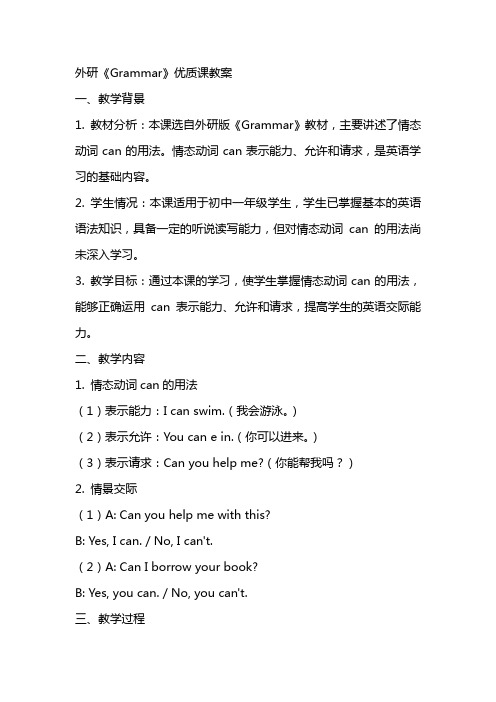
外研《Grammar》优质课教案一、教学背景1. 教材分析:本课选自外研版《Grammar》教材,主要讲述了情态动词can的用法。
情态动词can表示能力、允许和请求,是英语学习的基础内容。
2. 学生情况:本课适用于初中一年级学生,学生已掌握基本的英语语法知识,具备一定的听说读写能力,但对情态动词can的用法尚未深入学习。
3. 教学目标:通过本课的学习,使学生掌握情态动词can的用法,能够正确运用can表示能力、允许和请求,提高学生的英语交际能力。
二、教学内容1. 情态动词can的用法(1)表示能力:I can swim.(我会游泳。
)(2)表示允许:You can e in.(你可以进来。
)(3)表示请求:Can you help me?(你能帮我吗?)2. 情景交际(1)A: Can you help me with this?B: Yes, I can. / No, I can't.(2)A: Can I borrow your book?B: Yes, you can. / No, you can't.三、教学过程1. 导入:教师通过提问引导学生思考生活中可以用到情态动词can 的场景,激发学生学习兴趣。
2. 新课呈现:教师通过图片和例句展示情态动词can的用法,引导学生理解并模仿。
3. 课堂活动:教师组织学生进行小组活动,运用情态动词can进行情景交际,提高学生的实际应用能力。
4. 巩固练习:教师设计练习题,让学生运用情态动词can进行句子编写,检查学生掌握情况。
5. 课堂小结:教师总结本节课所学内容,强调情态动词can的用法和情景交际的重要性。
四、作业布置1. 抄写情态动词can的用法例句,每人至少5个。
2. 运用情态动词can编写一个短对话,描述自己或朋友的能力、允许和请求。
五、教学反思教师在课后对本节课的教学进行反思,分析学生的学习情况,针对存在的问题调整教学策略,为下一节课的教学做好准备。
Book 3 Unit 1 Grammar 情态动词 (一)

Book 3 Unit 1 Grammar 情态动词情态动词can,may,must,should,shall,will的用法比较情态动词有一定的含义,表达某种感情和说话的口气,不可以单独作谓语动词。
所以情态动词没有人称和数的变化,后面跟的动词需用原形,否定式构成是在情态动词后面加"not"。
个别情态动词有现在式和过去式两种形式, 过去式用来表达更加客气, 委婉的语气, 时态性不强, 可用于过去,现在或将来。
一.can / could 与be able to的用法比较1.can “能够,会”,过去式为could,表示能力,与be able to同义。
但be able to有各种时态,还可以表示成功地做了某事。
在否定句中can,could和be able to无区别。
He can speak English. 他会说英语。
He could speak English at the age of six. 他六岁就会说英语了。
I can’t / I will not be able to come this afternoon. 今天下午我来不了。
The fire spread quickly, but they were able to get out.火势蔓延得很快,但他们都成功地逃出来了。
2.can表示可能,怀疑,不相信或惊异的态度。
而could既可以表示过去也可以表示现在的“可能”,其可能性比can小。
Accident can happen any time. 事故随时都会发生。
This cannot be done by him. 这决不可能是他干的。
It could be true. 这也许是真的。
3.can / could 表示允许,could语气更委婉。
在回答对方提问时要用can,不用could。
-Could / Can I ask you a question?-Yes, of course you can.4.can / could + have done的否定式或疑问式表示对过去发生事情的不肯定或怀疑。
grammar(Modal Verbs)
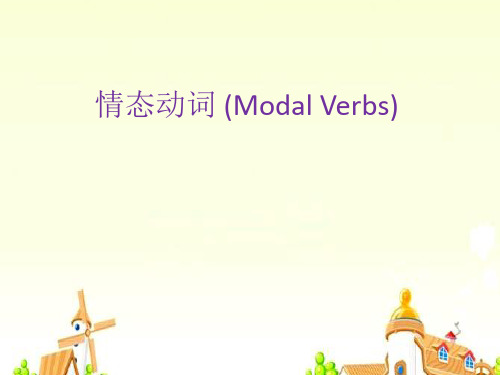
8. Harvest and Thanksgiving festivals can be very happy events. 收获节和感恩节是非常喜庆的节日。 9. Some people might win awards for their farm produce, like the biggest watermelon or the most handsome rooster. 有些人可能因为他们的农产品(参加评选)而获奖, 比如 最大的西瓜或最帅的公鸡。 10. These carnivals might include parades, dancing in the streets day and night, loud music and colorful clothing of all kinds. 狂欢节也许包括街头游行、昼夜跳舞、鼓噪的音乐和各种 艳丽的盛装。
(2)在回答以must引导的问句时, 若是否定答复, 不用 mustn’t, 而用needn’t 或don’t have to, 因为mustn’t表示禁 止, 意思是“绝不能”“一定不要”, 而没有“不必”的意 思。例如: —Must we hand in our exercises today? 我们今天必须交作业吗? —Yes, you must. 是的, 必须交。 —No, you needn’t/don’t have to. 不, 没必要。 3)用于否定句, 表示禁止 Smoking must not be allowed in the office. 严禁在办公室吸烟。 You mustn’t talk to girls like that. 你绝不能那样对女孩子说话。
人教版必修三Uint2Grammar情态动词分类

A
see you now. He is busy.
(2011 四川,20) The police still haven’t found the lost child, but they’re doing all they A . A. can B. may C. must D. should
三、表必要性 must: 一定,必须 have to: 不得不
二、表能力 can:表示现在的能力 could:表示过去的能力 be able to will be able to: 将来的能力 was/were able to:过去有能力并且成功地做了某事
技巧:这三个词不易混淆,所以做此类题时,一般通过翻译就能选出 答案。但是要注意题目的时态。 e.g. (2010 全国 II, 17) I’m afraid Mr. Harding A. can’t B. mustn’t C. shouldn’t D. needn’t
技巧:做到情态动词表示推测的题,一定要把题目读完,根据题目所 提供的信息判断填空部分所需要的语气。
e.g. He must be the wanted man, for he’s exactly like this picture. (因为他和照片很像, 能够判断出语气 是很肯定的) (2011 北京, 24)—I don’t really like James. Why did you invite him? —Don’t worry. He come. He said he wasn’t certain what his plans were. A. must not B. need not C. would not D. might not
四、表请求、建议、命令、允许、禁止 1.表示请求、建议 shall:用于一、三人称,表示征求对方意见。 may/might:表示允许、请求。 will/would:用于第二人称,表示请求或建议。 e.g. Shall the driver wait outside?司机在外边等着可以吗? must 必须 mustn’t 禁止;不准 should/ought to 应该 shouldn’t/oughtn’t to 不应该 (易错点) shall:常与二、三人称连用,表命令、警告、威胁、允诺。 will:表示意愿、决心。 e.g. (2011 陕西卷)——Will you read me a story, Mummy? ——OK. You _D_ have one if you go to bed as soon as possible. A. might B. must C. could D. shall(允诺) 2.表示命令、允诺
单元语法小专题(Grammar Focus)
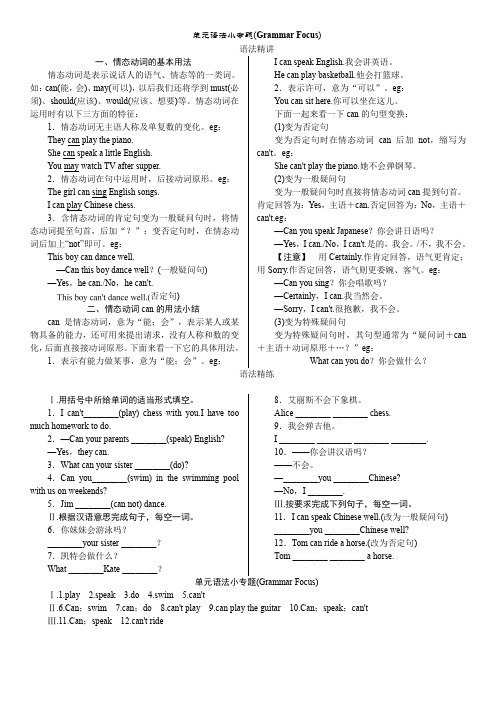
单元语法小专题(Grammar Focus)语法精讲一、情态动词的基本用法情态动词是表示说话人的语气、情态等的一类词。
如:can(能,会)、may(可以),以后我们还将学到must(必须)、should(应该)、would(应该、想要)等。
情态动词在运用时有以下三方面的特征:1.情态动词无主语人称及单复数的变化。
eg:They can play the piano.She can speak a little English.You may watch TV after supper.2.情态动词在句中运用时,后接动词原形。
eg:The girl can sing English songs.I can play Chinese chess.3.含情态动词的肯定句变为一般疑问句时,将情态动词提至句首,后加“?”;变否定句时,在情态动词后加上“not”即可。
eg:This boy can dance well.—Can this boy dance well?(一般疑问句)—Yes,he can./No,he can't.否定句)二、情态动词can的用法小结can是情态动词,意为“能;会”,表示某人或某物具备的能力,还可用来提出请求,没有人称和数的变化,后面直接接动词原形。
下面来看一下它的具体用法。
1.表示有能力做某事,意为“能;会”。
eg:I can speak English.我会讲英语。
He can play basketball.他会打篮球。
2.表示许可,意为“可以”。
eg:You can sit here.你可以坐在这儿。
下面一起来看一下can的句型变换:(1)变为否定句变为否定句时在情态动词can后加not,缩写为can't。
eg:She can't play the piano.她不会弹钢琴。
(2)变为一般疑问句变为一般疑问句时直接将情态动词can提到句首。
肯定回答为:Yes,主语+can.否定回答为:No,主语+can't.eg:—Can you speak Japanese?你会讲日语吗?—Yes,I can./No,I can't.是的,我会。
Unit 8 Grammar重点语法情态动词had better和should-八年级英语上册单元

班级姓名学号分数Unit 8 English week情态动词had better和should(时间:60分钟,满分:90分)一、单项选择(本大题共40小题,每小题1分,共40分)1.We’d better ________ something to eat now, or we’ll be hungry later.A.getting B.to get C.get2.Pansy got very sick yesterday afternoon. She’d better ________ to see the doctor.A.go B.not to go C.not go D.to go3.Your watch is broken. You ________ buy a new one.A.had better B.had better to C.had better not D.had better not to4.You had better ________ your homework quickly, or we will be late for the movie The Battle at Lake Changjin.A.finish B.to finish C.finishing D.finished5.It’s going to rain this afternoon. You’d better ________ the windows when you go out.A.close B.to close C.closed D.closing6.The library is very quiet. You’d better ________ here.A.not to laugh B.don’t laugh C.not laugh D.don’t to laugh7.You had better ________ your coat. It’s cold outside.A.put on B.not put on C.putting on D.to put on8.We ________ exercise every day if we want to keep healthy.A.maybe B.could C.would D.should9.—Oh, I’m very tired after finishing so much work.— I think you ________ have a good rest and go to bed early.A.should B.may C.can10.What a lifelike(逼真的)cat! I _____________ believe you made it out of paper.A.needn’t B.mustn’t C.can’t D.shouldn’t11.Children under 1.2 metres in height ________ take a free bus ride.A.can B.must C.need D.should12.Laura always arrives late for class, I think she ________ get up earlier.A.can B.must C.should D.might13.—Who do you think ________ get the job, Jenny or Jill? It’s hard to decide.—I think Jenny is smarter. But it’s up to you.A.should B.would C.might D.must14.— Only fifty-one books? There ________ be fifty-three.— Oh, Mr. Zhang took two away yesterday.A.should B.must C.can D.may15.—It’s easy to get the flu this season.—Yeah, so we ________ take off the masks in crowded places.A.needn’t B.wouldn’t C.shouldn’t D.may not16.To achieve good grades, we ________ keep good learning habits.A.might B.should C.needn’t D.can’t17.—What ________ I say when they interview (采访) me?—Take it easy. Just say what you think.A.should B.could C.need18.You ________ require others to deal with the problem like you. Everyone has his own way.A.mustn’t B.needn’t C.may not D.shouldn’t19.The doctor has suggested that Tim _______ lose at least 10 pounds to stay healthy.A.can B.should C.would D.may20.—In order to stop the spread of COVID-19, everyone________ get the vaccine (接种疫苗) in time.—It’s also the best way to protect ourselves.A.needn’t B.shouldn’t C.might D.should21.Students ________ listen to music while they are riding bikes on the road.A.must B.can C.needn’t D.shouldn’t22.—Jeff, I can’t stop playing computer games when I get home from school.—For your eyes and study, I think you _________ stop it.A.may B.need C.should D.could23.The little boy spoke in such a low voice that her mother ________ hardly (几乎不) understand what he said. A.must B.could C.might D.should24.—Shall I tell Mary about the good news tomorrow?—No, you __________. I told her about it yesterday.A.shouldn’t B.mustn’t C.wouldn’t D.needn’t25.As a teacher, you ________ be patient as you need to teach the students well.A.would B.can C.should D.may 26.—The woman over there looks like our English teacher.—It ________ be her. She is having a meeting in Hangzhou now.A.can’t B.mustn’t C.shouldn’t D.needn’t 27.You don’t look well. I think you ________ stop to take a break.A.shouldn’t B.should C.wouldn’t D.would 28.If you have a headache, you _______ lie down and have a good rest .A.had better B.shouldn’t C.had better not 29.Tony doesn’t do well in PE. He’d better ______ swimming every week. A.practise B.not practise C.to practise D.not to practise 30.The milk tastes bad. You’d better_______.A.throw it away B.to throw it awayC.throw them away D.to throw them away31.—You'd better ________ in your homework on time, or the teacher will be angry.—OK, I will.A.handing B.handed C.to hand D.hand 32.The man is badly hurt. We’d better _______ him before the doctors come.A.not move B.not to move C.don’t move D.not moving 33.You’d better _________ a phone call to check the timetable of the airline.A.make B.to make C.made D.making 34.The street is busy, You'd better ________ across it.A.not run B.not to run C.to not run D.don't run 35.You’d better __________ breakfast before __________ to school.A.to have;going B.have;going C.have;to go D.to have;to go 36.It’s raining heavily outside. You had better ________ at home.A.to stay B.staying C.stay D.to staying 37.You’d better that leather coat. It doesn’t look modern you at all.A.not to wear; on B.not to wear; in C.not wear; on D.not wear; in 38.We'd better ________ to Shanghai this summer.A.go B.going C.to go D.not going 39.You had better ________ hair tomorrow. It's too long.A.cut you B.cut yourC.not cut you D.not cut your40.You'd better _______ under the tree when it is raining in summer. It's dangerous.A.not stand B.stand C.not to stand D.to stand二、用所给单词的正确形式填空(本大题共15小题,每小题2分,共30分)41.It’s raining heavily. You’d better ________ (not go) outside.42.We’d better ________ (not search) for the answers to our homework on the Internet. 43.You’d better ________ (check) that you’ve locked the door.44.You’d better ________(pour) the milk into the blender.45.You’d better ________ (join) in some activities after school.46.We’d better ________ (take) a photo before we come back.47.We’d better ________ (take) a pair of binoculars when going birdwatching in Xuanwu Lake Park. 48.You’d better ________ (finish) your homework on time.49.You’d better ________ (come) here before six o’clock.50.You’d better _______ (come) here before six.51.You’d better ________ (not study) too late at night, or you’ll be tired.52.You’d better ________ (not go) out alone at night. It’s not safe.53.The baby is sleeping in the bedroom now. We’d better ________ (not knock) at the door. 54.You’d better ________ (not cut) your names on the bamboo here.55.To make your DIY perfect, you’d better ________ (not start) before you get all the tools ready.三、句型转换(本大题共10小题,每小题3分,共30分)56.You should write him a letter. (对划线部分提问)________ ________ ________ do?57.You shouldn’t drink tea or coffee at night.(对画线部分提问)What ________ we _________ at night?58.Why don’t you come and sit next to me. (同义句)You _________ ___________ come and sit next to me.59.Why don’t you come here earlier?(同义句转换)You _________ __________ here earlier.60.You’d better go to see your friend now.(改为否定句)You had ______ _____ go to se your friend now.61.You had better see a dentist at once. (改为否定句)You had better ________ ________ a dentist at once62.We had better begin our work without reading the instructions. (改为否定句) We’d _____ _______ begin our work without reading the instructions. 63.Tom should go to the hospital at once.(改为否定句)Tom ________ ________ go to the hospital at once.64.You should put off the meeting because of the weather.(改为否定句)You ________ ________ put off the meeting because of the weather. 65.Should I lie down and rest?(作肯定回答)Yes, __________ __________.参考答案:1.C【解析】句意:我们最好现在吃点东西,否则一会儿就会饿的。
grammar-(modal-verbs)

Peter has a good car and a big house with a garden.
must have lots of money. He ______ must be popular with people. He ______ can’ t be lacking in money. He ______
二、情态动词的语法功能
1.We use modal verbs to talk about: (1) Ability (能力) (2) Obligation (义务) (3) Certainty (可能性) (4) Permission (允许)
2.We also use modal verbs to:
Grabs)
本身没有一定的词义,表示语气的单词。但是不能独立 作谓语,只能和动词原形一起构成谓语。情态动词用在行为 动词前,表示说话人对这一动作或状态的看法或主观设想。 情态动词虽然数量不多,但用途广泛。
What can it be?
a white vase It may be ___________. two faces It might also be _________.
can 和 be able to 的区别
1)时态:can 只有现在时和过去式(could),be able to 可用于多种时态。(在将来时,完成时和非谓语 动词中应该用be able to)
e.g. So far, doctors have been able to do very little to treat(治疗) this kind of disease.
He is only four, but he can read. I can climb this mountain.
Unit grammar情态动词必修三

When you eat fish you must be careful
中
儿 童 医
南 大 学
with the bones. advice/ necessity Wang Feng has won the English
学湘 中雅
competition three times. He must be
医
院 today, but we might do better tomorrow.
possibility
3. will and would
During the Spring Festival time the whole
family will come for dinner.
中
儿 童 医
南 大 学
might, ought to, must
中
儿 童 医
南 大 学
学湘
可情态可实义 可情态可助动词
need, dare shall / should, will / would
中雅 心二
相当于情态动词
have to, used to
医
院
can和could
1) can的主要用法是:
中A. 表示体力或脑力的能力:
but
the
teacher said that we could not leave early.
permission
The hunters have been lost for days.
中
儿 童 医
南 大 学
学湘
They could staporsvseib.ility Could you please show me the way to
Unit2 Section Ⅲ Grammar—情态动词(二) 高中英语(2019外研版必修第二册)

[即学即练] 选出下列句中may的含义
A.表示许可
B.表示推测
C.表示祝愿
(1)May you be happy!( C )
(2)I think he may come today.( B )
(3)You may keep the book for 2 weeks.( A )
museum upon her death. 6.Co_m__p_e_ti_ti_o_n (compete) between small and big farms is fierce. 7.They decorated the apartment ___w_i_th___ streamers and party
He may come, or he may not. 他可能来,也可能不来。
It may/might rain this afternoon. You'd better take a raincoat with you.
今天下午可能会下雨。你最好带上雨衣。 3.may用于祈使句,表示祝愿。 May you succeed!祝你成功! 4.“may/might as well+动词原形”表示“不妨,还不如”。
如果没有他的努力工作,他是不可能取得好成绩的。(经过努力)
[即学即练] 选出下列句中can/could的含义
A.表示能力
B.表示推测
C.表示请求和许可 D.表示理论或习惯上的可能性
(1)I believe that he can't be so rude.( B )
(2)I can speak English fluently while he can't.( A )
grammar-情态动词

3) would表示过去反复发生的动作或某 种倾向。would表示过去习惯时比used to正式,且没有“现已无此习惯”的含 义。例如:
During the vacation, he would visit me every other day. The wound would not heal. 4) 表示估计和猜想。例如: It would be about ten o’clock when she left home.
---- May/Might I take this book out of the room?
---- Yes, you can. (No, you can’t / mustn’t. )
用May I...?征徇对方许可时比较正式和 客气,而用Can I...?在口语中更常见。
2) 用于祈使句,表示祝愿。 例如:
2) must是说话人的主观看法,而have to 则强调客观需要。Must只有一般现在 时,have to 有更多的时态形式。 例如:
His play isn’t interesting, I really must go now. I had to work when I was your age.
1) shall 用于第一人称,征求对方的意见。 例如:What shall we do this evening?
2) shall 用于第二、三人称,表示说话人给 对方的命令、警告、允诺或威胁。
You shall fail if you don’t work hard. (警告)
He shall have the book when I finish it.(允诺) He shall be punished.(威胁)
八年级上册英语grammar知识点

八年级上册英语grammar知识点英语是一门重视语法的语言,因此掌握好英语语法知识是学好英语的重要前提。
八年级上册英语grammar知识点包括了句子成分、时态、语态、情态动词等多个方面。
下面就对这些知识点进行一一介绍。
一、句子成分英语句子由主语和谓语构成,其它成分则是辅助、补充主语和谓语,主要包括:宾语、表语、定语、状语等。
1. 主语:句子的动作执行者或者接受者,即动作的主体。
动物也需要爱护。
(Animals also need to be loved.)动物(主语)需要(动词)爱护。
2. 谓语:对主语动作状态、特征的说明,包括动词和助动词。
My dad will be watching TV this evening.我爸爸今晚会看电视。
3. 宾语:由动词直接作用的名词、代词、不定代词、不定式等。
I want a cup of milk.我想要一杯牛奶。
4. 定语:对名词或代词起修饰或限制作用的成分。
The girl wearing glasses is our new teacher.戴眼镜的女孩是我们的新老师。
5. 表语:是由系动词修饰的,用来说明主语的特征、状态、性质等的成分。
The eggplant tastes bitter.茄子有苦味。
二、时态时态是指动作发生的时间,包括一般现在时、一般过去时、一般将来时、现在进行时、过去进行时、将来进行时、现在完成时、过去完成时、将来完成时等。
1. 一般现在时:表示现在的状态、习惯性动作或客观事实。
I get up at six o'clock every morning.我每天早上六点起床。
2. 一般过去时:表示过去发生的动作或存在的状态。
I saw a movie with my friends last night.昨晚我和朋友去看了电影。
3. 一般将来时:表示将要发生的动作或存在的状态。
I will go on a trip next month.我下个月要去旅行。
Unit 3Grammar 英语动词种类
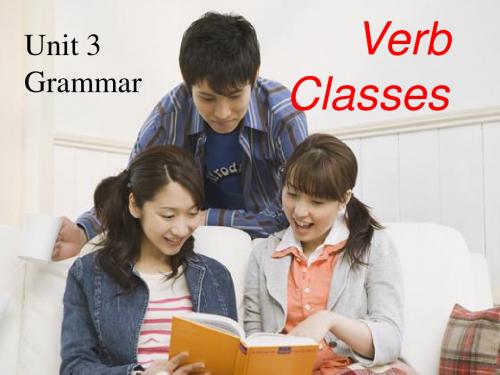
Verb Classes
动词的种类
1.连系动词
2 .助动词 3 .情态动词
4 .实义动词 (行为动词)
1.连系动词
要与表语一起构成谓语
常用的系动词:be, become, seem get, grow, look, smell, feel,
sound, turn
ห้องสมุดไป่ตู้
1)状态系动词 用来表示主语状态,只有be一词,例 如:He is a teacher(is与补足语一 起说明主语的身份。) 2)持续系动词 用来表示主语继续或保持一种状况或 态度,主要有keep, rest, remain, stay, lie, stand, 例如: He always kept silent at meeting. This matter rests a mystery. 此事 仍是一个谜。
• 2)would也无词义,是will的过去形 式,与动词原形构成过去将来时,用 于第二、第三人称,例如:He said he would come.比较: "I will go," he said. 他说:"我要 去那儿。"变成间接引语,就成了:He said he would come. 原来的will变 成would,go变成了come.。
I do not want to be criticized. He doesn‘t like to study. In the past, many students did not know the importance of English.
构成否定祈使句 Don‘t go there.不要去那里。 Don’t be so absent-minded.这么心不在 焉。 说明: 构成否定祈使句只用do,不用 did和does。 4) 放在动词原形前,加强该动词的语 气,
M11_Grammar_情态动词may_might的用法

常用于:“neither+助动词/情态动词/be动词+主语”结 构中。 I don’t know about it? Neither do I.我也不了解。 若前面提到的是肯定的事实或情况,表示“…也一样” 时要用“so+助动词/情态动词/be动词+主语” --David enjoys listening to pop music. ---so do I.我也是。 neither…nor…既不…也不… either…or… 或者…或者… not only…but also不仅…而且… 就近原则
as well as/with 和
就前原则
12.I wish I were in Austrain now.采用了虚拟语气。虚拟 语气表示假想或主观愿望,往往与现实不符或难以实现。 虚拟语气中的be动词都要用were,其他动词用过去式。 I wish I were a dancer now. wish v.但愿,希望 We wish we could fly. n.祝愿
9.Sounds great!听起来很棒 sound用作系动词,“听起来”,后接形容词作表语 sound like “听起来像” sound good
10.Me neither.我也不 Me too.我也一样 neither是副词,“(某人或某物)也不”,用于前面 否定的内容也适用于另一个人或物。 --I won’t go to museum. --Me neither. --I like animals. --Me too.
7.what’s the temperature? temperature n.“温度,气温。”不可数n 。形容温度 的高低分别用high和low。 The temperature of the water is 40 degrees.
九年级上册unit8Grammar情态动词表推测

been working for an hour.
A. must not B. won’t
C. can’t
D. may not
大家好
4. — Is John coming by train?
— He should, but he _____ not. He
likes driving his car.
A. must
B. can
C. need
D. may
大家好
THANKS
大家好
结束
大家好
D. can
大家好
2. — Isn’t that Ann’s husband over
there?
— No, it _____ be him — I’m
sure he doesn’t wear glasses.
A. can’t
B. must not
C. won’t D. may not
大家好
3. You ____ be tired — you’ve only
Gra
1
一、肯定推测
• 1、must • 表示肯定推测,意思是“一定、准是”。只能用于
肯定句。 He must know the answer. 他肯定知道答案。
大家好
should
• 用于肯定句,语气次之,意为“应该”,指按常理推 测。
• They left yesterday,they should be home now. • 他们昨天就离开了,现在应该到家了。
大家好
could might
• 也可表示推测,常用于过去时态; • 但在某些场合下,为了使语气更缓和,更委婉,常用
could\might代替can和may
Book 3 Unit 2 Grammar 情态动词 (二)
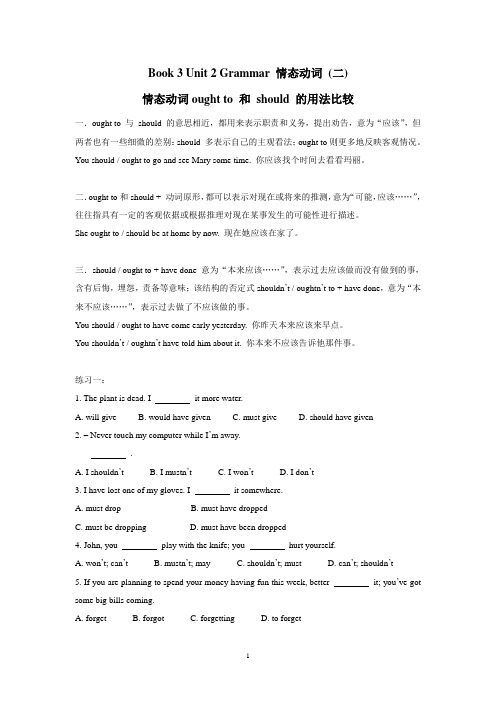
Book 3 Unit 2 Grammar 情态动词(二)情态动词ought to 和should 的用法比较一.ought to 与should 的意思相近,都用来表示职责和义务,提出劝告,意为“应该”,但两者也有一些细微的差别:should 多表示自己的主观看法;ought to则更多地反映客观情况。
You should / ought to go and see Mary some time. 你应该找个时间去看看玛丽。
二.ought to和should + 动词原形,都可以表示对现在或将来的推测,意为“可能,应该……”,往往指具有一定的客观依据或根据推理对现在某事发生的可能性进行描述。
She ought to / should be at home by now. 现在她应该在家了。
三.should / ought to + have done 意为“本来应该……”,表示过去应该做而没有做到的事,含有后悔,埋怨,责备等意味;该结构的否定式shouldn’t / oughtn’t to + have done,意为“本来不应该……”,表示过去做了不应该做的事。
You should / ought to have come early yesterday. 你昨天本来应该来早点。
You shouldn’t / oughtn’t have told him about it. 你本来不应该告诉他那件事。
练习一:1. The plant is dead. I it more water.A. will giveB. would have givenC. must giveD. should have given2. – Never touch my computer while I’m away.- .A. I shouldn’tB. I mustn’tC. I won’tD. I don’t3. I have lost one of my gloves. I it somewhere.A. must dropB. must have droppedC. must be droppingD. must have been dropped4. John, you play with the knife; you hurt yourself.A. won’t; can’tB. mustn’t; mayC. shouldn’t; mustD. can’t; shouldn’t5. If you are planning to spend your money having fun this week, better it; you’ve got some big bills coming.A. forgetB. forgotC. forgettingD. to forget6. You use my bike on condition that you give it tome before I leave here.A. shouldB. mustC. ought toD. shall7. The old man is always hunting the lions, so terrible things happen to him.A. canB. wouldC. shouldD. could8. – Are you coming to Jeff’s Party?- I’m not sure. I go to the concert insteadA. mustB. wouldC. shouldD. might9. – Shall I tell John about it?- No, you . I have told him already.A. needn’tB. wouldn’tC. mustn’tD. shouldn’t答案DCBBA DCDA。
专题03 Module 2 语法Grammar 情态动词can的用法-七年级英语下册单元重难点易错

班级姓名学号分数Module 2 What can you do?Grammar 情态动词can的用法(时间:100分钟,满分:100分)一、单项选择(本大题共40小题,每小题1.5分,共60分)1.(2021·江苏·无锡市锡山区教师发展中心七年级期末)— Could I keep the windows________? There are too many people in the room.— Of course you ________. It is important to let the fresh air in.A.open; could B.closed; can C.open; can D.closed; could 2.I ________ ride a bike, but I ________ drive a car.A.can, can B.can’t, can’t C.can, can’t 3.(2019·新疆奇台·七年级期末)— Can your sister sing this song ?—Yes,she .A.can B.do C.does D.is 4.(2020·江苏·苏州市吴江区盛泽第二中学七年级期末)— ______ you help me with my homework?— Of course if I ______.A.Could; could B.Can’t; can C.Could; can D.Can; could 5.— Can your brother ________? —Yes, he________.A.play the chess; can B.play chess; canC.play chess; is D.play the chess; is6.Tony can ________ the guitar. Now he ________ the guitar.A.play; plays B.playing; playing C.plays; is playing D.play; is playing 7.(2018·山东·青岛市崂山区育才学校七年级开学考试)Ms.Wang is friendly. She________good with all the students at school.A.can do B.can be C.be D.can is 8.(2019·安徽·合肥市第四十五中学七年级期中)—________ I borrow the books from the library, Miss Yang?—Sorry, you________. These books are only for members of the English Club.A.Can; couldn’t B.Could; can’tC.Could; couldn’t D.Can; needn’t9.(2018·福建·厦门一中七年级期中)— What are the school rules?— We________listen to music in class.A.don’t B.can’t C.aren’t10.Betty is busy with her homework, so she ________ come with us tomorrow. A.can’t B.canC.is D.isn’t11.—What ________ Maria ________?—She can sing.A.do; do B.can; do C.does; do D.do; does 12.—Can you and Tom draw?—________.A.Yes, I can B.No, he can'tC.Yes, we can't D.No, we can't13.She ________ Chinese and she can also ________ a little English.A.speak; speaks B.speak; speak C.speaks; speak D.speaks; speaks 14.Can the boy ________ in English?A.sing B.sings C.to sing D.singing 15.—Can Bill and Jill sing and dance?—__________.And they do very well.A.Yes,they can B.No,they can'tC.Yes,they do D.No,they don't16.—Can Li Xin do Chinese kung fu?—__________,but he can play Chinese chess.A.Yes,he can B.No,he can'tC.Yes,he does D.No,he doesn't17.—Can you swim?—__________.It's very easy.A.Yes,I do B.Sorry,I can'tC.Yes,I can D.No,I can't18.I ________ ride a bike, but I ________ drive a car.A.can; can B.can't; can'tC.can; can't D.am; am not19.(2019·浙江浙江·七年级期中)—Can you walk on your hands?—Yes, I ________, but not very ________.A.can't, well B.can, good C.can, well D.can't, good 20.(2019·浙江浙江·七年级期中)——Can you Play the erhu?——________.And I ____play the piano, too.A.Yes, I can; can B.No, I can't; can't C.No, I can't; can D.Yes, I can; can't 21.(2019·福建·莆田第二十五中学七年级期中)—? —Yes, B-O-O-K, book. A.Can you spell it B.How do you spell it C.What is this22.—he speak English?— Yes, he can.A.Do B.Does C.Is D.Can 23.(2019·全国·七年级单元测试)Jane_______swim in the past, but now she_______ .A.can; may B.couldn't; can C.can't; could D.can't; couldn't 24.(2019·北京·七年级课时练习)Excuse me. Can you please tell mewhere get a digital camera?A.can I B.do I C.I can D.I do25.I want to join the swimming club, but I _______swim.A.can't B.can C.don't D.aren't 26.(2018·新疆且末·七年级期末)She can English.A.speaking B.speak C.speaks D.to speak27.I ride a bike, but I drive a car.A.can; can B.can’t; can’t C.can’t; can D.can; can’t 28.— Can you swim?—.A.No, I’ m not B.Yes, I am C.No, I can’t D.Yes, I can’t 29.—Is that Mr. Zhou?It be him. He has gone to Beijing.A.may B.can C.can’ t30.(2019·全国全国·七年级课时练习)— I can't climb mountains in the rain.— I _________ climb mountains,either.A.can't B.can C.aren't D.are 31.(2018·河南南召·七年级期末)I read little English when I was 10 years old, but now I read a lot.A.can; can B.could; could C.could; can D.can; could 32.(2019·重庆开州·七年级期末)Judy play the guitar now, but she play it two years ago.A.could, can B.can, could C.couldn't, can D.can, couldn't 33.(2019·广东·佛冈县潖江中学七年级单元测试)— _____ Alice perform ballet two years ago?—No, she _____ . But now she _____ .A.Can; can’t; could B.Could; can; canC.Could; couldn’t; could D.Could; couldn’t; can34.(2019·新疆·七年级期中)The little boy _______ play the piano. But he can singsongs_________ .A.can, good B.can’t, well C.can’t, good D.can,well 35.(2019·贵州·普安县三和学校七年级单元测试)___she ____ Chinese ?A.Do ,speak B.Does , speaks C.Can, speaks D.Can, speak 36.(2019·全国·七年级单元测试)I can play the guitar and I ___also play the drums. A.can’t B.can C.do D.don’t 37.(2019·广东·陆丰市民声学校七年级期中)Mom, can I watch TV now? -____.You must do your homework.A.Sure B.No, you don’t C.Yes, you can D.No, you can’t 38.(2019·广东东莞·七年级阶段练习)—Can I use your telephone, please?—No, you ________.A.can B.do C.can't D.don't 39.(2019·全国·七年级课时练习)-May I take this book out?一No,you .A.can't B.could notC.needn't D.aren't40.(2019·新疆新疆·七年级期中)We_______noisy or eat in class at school.A.can B.can’t be C.can’t D.can be二、完成句子(本大题共10小题,每小题2分,共20分)41.我会说英语,并且我也会踢足球。
- 1、下载文档前请自行甄别文档内容的完整性,平台不提供额外的编辑、内容补充、找答案等附加服务。
- 2、"仅部分预览"的文档,不可在线预览部分如存在完整性等问题,可反馈申请退款(可完整预览的文档不适用该条件!)。
- 3、如文档侵犯您的权益,请联系客服反馈,我们会尽快为您处理(人工客服工作时间:9:00-18:30)。
1.--Excuse me, but I want to use your computer to type a report. A have my computer if you don’t take --You ____ care of it. A. shan’t B. might not C. needn’t D. shouldn’t 2. ---When can I come for the photos ? I need them tomorrow afternoon. B ---They _____be ready by 12 : 00 . A. can B. should C. might D. need 3. With so much work on hand, you ____to D see the game last night. A. mustn’t go B. could have gone C. shouldn’t go D. shouldn’t have gone
Modal verbs I
情态动词的语法特征
1. 情态动词有一定的意义,只表示期待或估计某事的 发生,不能表示正在发生或已经发生的事情。 2. 没有人称和数的变化,即情态动词第三人称单数不 加-s。 3. 不能独立使用,它和后面的动词构成谓语。 4. 情态动词 除ought 和have 外,后面只能接不带 to 的不定式。 5. 情态动词没有非谓语形式,即没有不定式,分词, 等形式。
He might be doing his homework now. (可能性更小)
2.might/may have done,表示对过去发生的动作进行 可能性推测, 他可能去医务室了。 He may have gone to the clinic. 他可能已经从报纸上知道这个消息了。 He might have read about the news in the newspaper.
can/could have done 表对过去发生行为的可能性进行推测
“本可以,本来可能已经”用于肯定句中 刚才我还看见他了, 所以他不可能出国的。 你本来可以考的更好。
I saw him just now so he couldn’t have gone abroad. You could have had a better mark.
Let's speed up. They may/might be waiting for us now. A: Why hasn't he come? B: He may have missed the train.
• You may keep the book for two weeks.(许可) • May/Might I have a word with you ? • ---May I come in ? --- yes, you may/ can. (No , you can't /mustn't.) We may leave the hall as soon as the meeting is over (许可或请求对方许可,用于第一人称时指我或我们被允许 做某事;用于其他人称时,则指说话人允许做某事) May you succeed! May God bless you !
must
1.Must 表示推测时, 只能用于肯定句。
must do must be doing/do must have done 对一般时的肯定推测 对现在的动作进行肯定推测 对过去发生的事情作出的肯定判断
他们买了一辆新车。 他们一定很有钱 They have bought a new car. They must have a lot of money.
They should be at home by now, for they have been away for two hours. • It should be a nice day tomorrow. • He should have finished the task. 6. "竟然,居然“ 表示惊奇、愤怒、失望等情 绪 I am sorry that he should be so stubborn.
• 1. I can speak English and French, but I can't speak Japanese.(能力,“能,会”) • 2.--- Can/Could I use your cell phone? --- Of course you can. He said I could use the computer.(许可或请求,肯定或疑问) 3. ---Can she be in the classroom now? --- No, she can't. Can what he said be true?(推测,疑问句或否定句) 4.Accidents can happen at any time. It could be very interesting to go out for a drive. Anybody can make mistakes. It can be quite cold at night here.(客观的理论上的可能性 ,“有事可能会”,并不涉及具体某事会发生,要表达具 体某事实际发生的可能性时,要用may或might.肯定句中 )eg. Peter may come to the club with us tonight.
她们明天可能会到这里来。
They may come here tomorrow.
▲ might 可用于指 过去的行为 或者表示可能性更小。
我问他我是否可以离开。
I asked him if I might leave. (表过去) I asked him “May I leave now?”
他也许在作功课吧。
ห้องสมุดไป่ตู้
他现在一定在看小说 He must be reading novels now.
路是湿的。昨天晚上一定下雨了。 The road is wet. It must have rained last night.
说话人的主观看法和愿望
• —— Must we hand in our homework today? • ----- Yes, you must./ No , you needn't /don't have to. • You mustn't lend my new book to others.
• Will/would you come this way, please?(请求、建议,第 二人称疑问句中) • I will never do that again. ---Can someone help me? ---I will. She said she would take care of the child.(意志、意愿和 决心,“愿,要”) Oil will float on water. Fish will die out of water.(倾向性、规律性的“注定会”) This will be the book you want.(will be对目前情况的推测) Nancy will keep talking unless you tell her to shut up.(习惯 或特性,用于现在,“总是,总会”)
只作情态动词的 可情态可实义的 can/could, may/might, ought to, must need, dare/dared
可情态可助动词的 shall/should, will/would 相当于情态动词的 have to, used to
Must , can/could, may/might 的用法
shall ,should 和ought to 1.在陈述句中,shall用于二、三人称表示允诺、警告、 命令、决心等。 You shall do as I say. (命令) Nothing shall stop me doing it. (决心) Tell him that he shall have the book tomorrow. (允诺) You shall fail if you don't work harder.(警告) She shall be punished.(威胁) 2.在疑问句中,用于一、三人称,用来表示请求或征 求意见。
• Why must you always interrupt me ? • Why must it rain on Sunday? • If you must know...( 偏要,偏偏)
can/could
1. can /could 表示推测时,只能用在否定句或疑问句中。 这么晚了,汤姆还在看书吗? It’s so late. Can Tom be reading? 这个人不可能是玛丽, 她生病了。 It can’t be Mary. She has fallen ill.
will/would
Will /Would you do…? 表请求,表意志,愿望,决心
If you will help me with my English, I will be very happy. I promised that I would do my best.
would表过去反复发生得动作或某种倾向“总是,总要” used to表过去常常(现在已没有这种习惯)“过去常常” used to 可于状态动词连用 would不可以 eg. He used to be a quiet boy. ( √ ) He would be a quiet boy. ( × )
注:might 表示请求时,不是may 过去式, 只是一种委婉的语气,与时态无关;表示 推测时,不是may的过去式,只是可能性更 小。 Our football team didn't play very well today,but we might do better tomorrow. He may/might know where the headmaster lives. The manager may/might tell him about it this afternoon.
